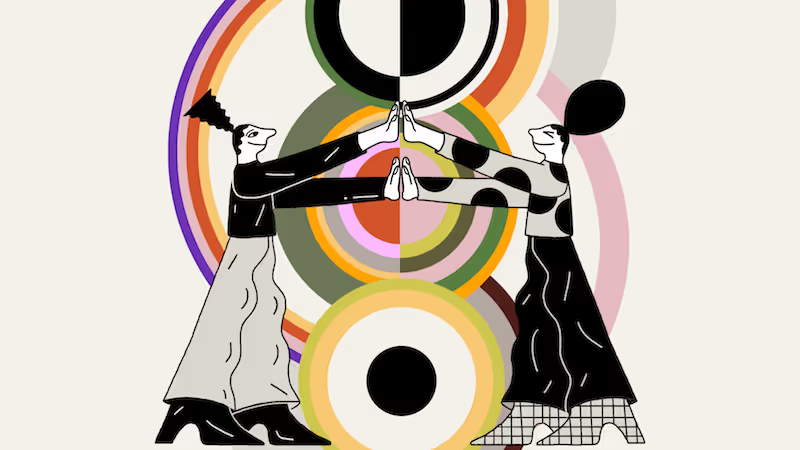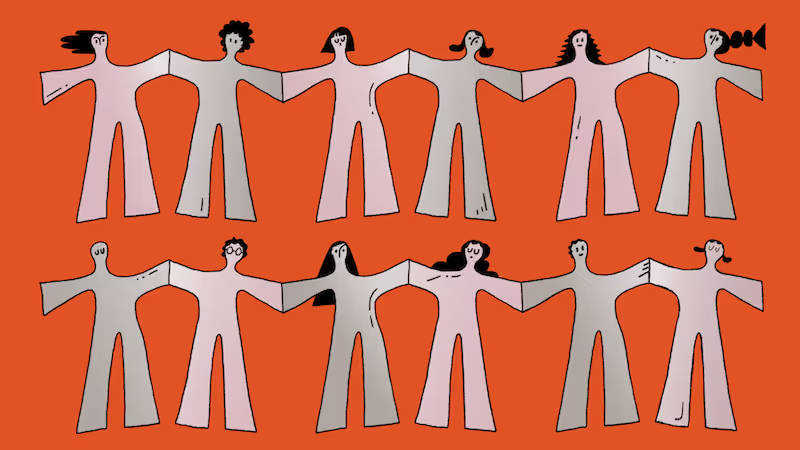Shall We Begin?
Last month, as a guest on the podcast Death, Sex, and Money, I was asked interesting questions that people don’t usually ask me—not about sex and romance, but about the importance of friendship.
I spoke about my models of friendship: how my parents emphasized hospitality and how friendship was a necessity because our extended family had all been killed during WWII. How my move to New York City in my twenties reinforced the importance of community. As a young, undocumented immigrant, I was grateful to be able to cultivate friendships with older people who became like surrogate parents. As I grew, so did my circle.
Recently, I was invited to speak at the Vivid Ideas festival in Australia to talk about relationships in the digital age, the great paradox of which is that technology makes it both easier to connect with people all over the world and to disconnect from the people right in front of us.
Australia. The first time I heard that word I was six. My father took me to the harbor in Antwerp to pick up a friend arriving by ship from Australia. He had been at sea for three weeks. He may as well have come from another planet. It was the first time I saw how friendships can be picked up later in life in a completely different context than how they began. And Australia has continued to pop up in my life that way. When I was thirty, my family and I visited the places where my parents were from in Poland. There, I met Helen Gory, also a daughter of holocaust survivors living in, of all places, Australia. She and her father were on a similar trip. We bonded over tragedy—and then over vodka. Children of families who have experienced dislocation, psychosocial trauma, and the tribulation of migration have a way of skipping small talk. It doesn’t matter if you grew up in Belgium or Melbourne, you have the same stories in your veins, the same osmosis of the lived-in experiences of your parents.
Finally, last month, it was my turn to go to Australia. When I told Helen I would be coming, she said “you’re staying with me and I’m picking you up at the airport,” and so it was.
Hospitality has remained essential to my family’s lifestyle. Friends and their children often stay with us and we stay with them. I can now help young friends the way I was once cared for, and that intravenous of youth teaches me about where the world is going. Great friendships have enabled me to be the recipient of that transmission of experience, just as they have encouraged me to be the conferrer of such benefits.
Last year, my husband, Jack Saul, organized a 60th birthday gathering. As Priya Parker explained to us then: when people gather, they are there for you, but they are also there for themselves. For when we know that we matter to others, it gives us a significance. Many of you have heard me explain how, today, we turn to one person, our partner, to provide what an entire village once did: a sense of grounding, meaning, and continuity. Today, I am meditating on the importance of the village: how I have built my village and how you can build and maintain yours. Remember: it is the quality of our relationships that determines the quality of our lives.
Let’s Turn the Lens on You
No matter how deep your connection is, friendships require emotional maintenance. Connection creates positive by-products; it is an antidote to loneliness. Friends are a lifeline, an oxygen mask. And Object Constancy—our capacity to understand that an absent person or object exists and will return—is a muscle that needs to be exercised. Consider this a workout plan for the friendships that matter most to you:
Write a letter to the friend who’s been on your mind: I don't have diaries, but my letters are the chronology of my life. I have every letter I’ve ever received and even some that I’ve written. Some I sent; others I knew better.
Here’s a way to start: “I’ve been doing the inventory of my life and I thought of you. Last we spoke you were doing X and Y. Is this still the case?” Or, “I told somebody about you this week and, as I was talking about this event in my life, you were a part of the story.”
Map your social network IRL: I always ask patients: who are the people that matter in your life? The answer usually involves friends and family, but also mentors, godparents, neighbors, and teachers. I have had many, many people reconnect with a teacher.
Expand your circle: Try hosting a dinner party or picnic in which each person brings a few other friends who don’t already know each other. It’s a great way to integrate friend groups and that kind of multiplier is especially helpful if you're new in town.
Ask better questions and inspire deeper conversations: So often, we introduce ourselves with what we do, rather than who we are or what’s on our mind. Consider ways to open up new dialogue by asking questions such as what are you passionate about? Or what have you been thinking about lately? Avoid the trap of boring shop talk by focusing on people not things.
More From Esther
Sonnet versus Tweet / Vivid Sydney
My talk about exploring the tricky territories of online dating, screen addiction, social media, and why it’s so easy to plug-in but so hard to stay connected.
Rethinking Eroticism / Armchair Expert Podcast
A wide-ranging conversation with Dax Shepard and Monica Padman about eroticism, parenting, and the unrealistic expectations we put on our partners.
The Shape of Infidelity / Red Table Talk
My talk with Jada Pinkett Smith and Adrienne Banfield-Norris about how infidelity has shaped their views of marriage and about my work with couples in the midst of crisis.
Conversation Starters
A compendium of highly recommended sources of inspiration and information
On connection in the digital age, I’m reading:
- Dr. Jean M. Twenge’s book, iGen: Why Today's Super-Connected Kids Are Growing Up Less Rebellious, More Tolerant, Less Happy—and Completely Unprepared for Adulthood—and What That Means for the Rest of Us.
- Greg Lukianoff and Jonathan Haidt’s book, The Coddling of the American Mind: How Good Intentions and Bad Ideas Are Setting Up a Generation for Failure
- And watching: Priya Parker’s TED Talk
- Baratunde Thurston’s TED Talk about how to deconstruct racism, one headline at a time
On Women and Leadership, I’m Watching:
- Erin Bagwell’s documentary, Dream Girl, which features groundbreaking stories of women entrepreneurs.
- And reading: Joanne Lipman’s book, That’s What She Said: What Men Need to Know (AND WHAT WOMEN NEED TO TELL THEM) About Working Together
I’m Listening To:
- Sona Jobarteh & Band’s Kora Music from West Africa
- Deva Mahal, whose concert at Carnegie Hall totally enchanted me.
I hope these recommendations will inspire conversations with friends old and new.







.svg)





